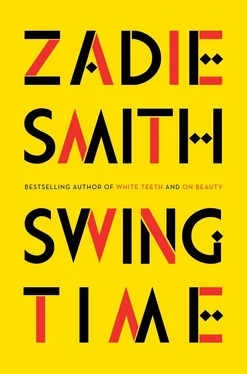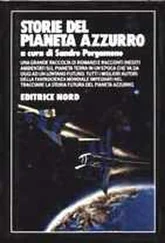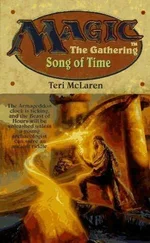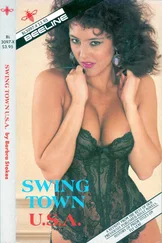Zadie Smith - Swing Time
Здесь есть возможность читать онлайн «Zadie Smith - Swing Time» весь текст электронной книги совершенно бесплатно (целиком полную версию без сокращений). В некоторых случаях можно слушать аудио, скачать через торрент в формате fb2 и присутствует краткое содержание. Город: NYC, Год выпуска: 2016, ISBN: 2016, Издательство: Penguin Publishing Group, Жанр: Современная проза, на английском языке. Описание произведения, (предисловие) а так же отзывы посетителей доступны на портале библиотеки ЛибКат.
- Название:Swing Time
- Автор:
- Издательство:Penguin Publishing Group
- Жанр:
- Год:2016
- Город:NYC
- ISBN:978-0-39956-431-4
- Рейтинг книги:4 / 5. Голосов: 1
-
Избранное:Добавить в избранное
- Отзывы:
-
Ваша оценка:
- 80
- 1
- 2
- 3
- 4
- 5
Swing Time: краткое содержание, описание и аннотация
Предлагаем к чтению аннотацию, описание, краткое содержание или предисловие (зависит от того, что написал сам автор книги «Swing Time»). Если вы не нашли необходимую информацию о книге — напишите в комментариях, мы постараемся отыскать её.
Dazzlingly energetic and deeply human,
is a story about friendship and music and stubborn roots, about how we are shaped by these things and how we can survive them. Moving from northwest London to West Africa, it is an exuberant dance to the music of time.
Swing Time — читать онлайн бесплатно полную книгу (весь текст) целиком
Ниже представлен текст книги, разбитый по страницам. Система сохранения места последней прочитанной страницы, позволяет с удобством читать онлайн бесплатно книгу «Swing Time», без необходимости каждый раз заново искать на чём Вы остановились. Поставьте закладку, и сможете в любой момент перейти на страницу, на которой закончили чтение.
Интервал:
Закладка:
Saturday was her “day off.” Day off from what? From us. She needed to read up on her isms. After my father took me to dance class we had to keep going somehow, find something to do, stay out of the flat until dinner time. It became our ritual to travel on a series of buses heading south, far south of the river, to my Uncle Lambert’s, my mother’s brother and a confidant of my father’s. He was my mother’s eldest sibling, the only person I ever saw from her side of the family. He had raised my mother and the rest of her brothers and sisters, back on the island, when their mother left for England to work as a cleaner in a retirement home. He knew what my father was dealing with.
“I take a step toward her,” I heard my father complain, one day, in high summer, “and she takes a step back!”
“Cyan do nuttin wid er. Always been like dat.”
I was in the garden, among the tomato plants. It was an allotment, really, nothing was decorative or meant simply to be admired, everything was to be eaten and grew in long, straight lines, tied to sticks of bamboo. At the end of it all was an outhouse, the last I ever saw in England. Uncle Lambert and my father sat on deckchairs by the back door, smoking marijuana. They were old friends — Lambert was the only other person in my parents’ wedding photo — and they had work in common: Lambert was a postman and my father a Delivery Office Manager for Royal Mail. They shared a dry sense of humor and a mutual lack of ambition, of which my mother took a dim view, in both cases. As they smoked and lamented the things you couldn’t do with my mother, I passed my arms through the tomato vines, allowing them to twist around my wrists. Most of Lambert’s plants seemed menacing to me, they were twice my height and everything he planted grew wildly: a thicket of vines and high grass and obscenely swollen, calabash-type gourds. The soil is of a better quality in South London — in North London we have too much clay — but at the time I didn’t know about that and my ideas were confused: I thought that when I visited Lambert I was visiting Jamaica, Lambert’s garden was Jamaica to me, it smelled like Jamaica, and you ate coconut ice there, and even now, in my memory, it is always hot in Lambert’s garden, and I am thirsty and fearful of insects. The garden was long and thin and it faced south, the outhouse abutted the right-hand fence, so you could watch the sun fall behind it, rippling the air as it went. I wanted badly to go to the toilet but had decided to hold on to the urge until we saw North London again — I was scared of that outhouse. The floor was wood and things grew up between the boards, grass blades, and thistles and dandelion clocks that dusted your knee as you hitched yourself up on to the seat. Spiders’ webs connected the corners. It was a garden of abundance and decay: the tomatoes were too ripe, the marijuana too strong, woodlice were hiding under everything. Lambert lived all alone there, and it felt to me like a dying place. Even at that age I thought it odd that my father should travel eight miles to Lambert’s for comfort when Lambert seemed already to have suffered the kind of abandonment my father feared so badly.
Tiring of walking through the lines of vegetables, I wandered back down the garden, and watched as the two men concealed their joints, poorly, in their fists.
“You bored?” asked Lambert. I confessed I was.
“Once dis house full of pick’ney,” said Lambert, “but dem children got children now.”
The image I had was of children my own age with babies in their arms: it was a fate I connected with South London. I knew my mother left home to escape all that, so that no daughter of hers would ever become a child with a child, for any daughter of hers was to do more than just survive — as my mother had — she was to thrive, learning many unnecessary skills, like tap dancing. My father reached out for me and I crawled on to his lap, covering his growing bald spot with my hand and feeling the thin strands of wet hair he wore combed across it.
“She shy, eh? You not shy of your Uncle Lambert?”
Lambert’s eyes were bloodshot, and his freckles were like mine but raised; his face was round and sweet, with light brown eyes that confirmed, supposedly, Chinese blood in the family tree. But I was shy of him. My mother — who never visited Lambert, except at Christmas — was strangely insistent that my father and I do so, though always with the proviso that we remain alert, never allowing ourselves to be “dragged back.” Into what? I wound myself around my father’s body until I was at the back of him and could see the little patch of hair he kept long at the nape of his neck, which he was so determined to maintain. Though he was only in his thirties, I’d never seen my father with a full head of hair, never known him blond, and would never know him gray. It was this fake nut-brown I knew, which came off on your fingers if you touched it, and which I had seen at its true source, a round, shallow tin that sat open on the edge of the bath, with an oily wheel of brown running round the rim, worn down to a bare patch in the middle, just like my father.
“She needs company,” he fretted. “A book’s no good, is it? A film’s no good. You need the real thing.”
“Cyan do nuttin wid dat woman. I knew it from time she was small. Her will is a will of iron.”
It was true. Nothing could be done with her. When we got home she was watching a lecture from the Open University, pad and pencil in her hand, looking beautiful, serene, curled up on the couch with her bare feet under her bottom, but when she turned round I could see she was annoyed, we’d come back too early, she wanted more time, more peace, more quiet, so she could study. We were the vandals in the temple. She was studying Sociology & Politics. We didn’t know why.
If Fred Astaire represented the aristocracy, I represented the proletariat, said Gene Kelly, and by this logic Bill “Bojangles” Robinson should really have been my dancer, because Bojangles danced for the Harlem dandy, for the ghetto kid, for the sharecropper — for all the descendants of slaves. But to me a dancer was a man from nowhere, without parents or siblings, without a nation or people, without obligations of any kind, and this was exactly the quality I loved. The rest of it, all the detail, fell away. I ignored the ridiculous plots of those movies: the opera-like comings and goings, the reversals of fortune, the outrageous meet cutes and coincidences, the minstrels, maids and butlers. To me they were only roads leading to the dance. The story was the price you paid for the rhythm. “Pardon me, boy, is that the Chattanooga choo choo?” Each syllable found its corresponding movement in the legs, the stomach, the backside, the feet. In ballet hour, by contrast, we danced to classical recordings—”white music” as Tracey bluntly called it — which Miss Isabel recorded from the radio on to a series of cassettes. But I could barely recognize it as music, it had no time signature that I could hear, and although Miss Isabel tried to help us, shouting out the beats of each bar, I could never relate these numbers in any way to the sea of melody that came over me from the violins or the crashing thump of a brass section. I still knew more than Tracey: I knew there was something not quite right about her rigid notions — black music, white music — that there must be a world somewhere in which the two combined. In films and photographs I had seen white men sitting at their pianos as black girls stood by them, singing. Oh, I wanted to be like those girls!
At quarter past eleven, just after ballet, in the middle of our first break, Mr. Booth entered the hall carrying a big black bag, the kind country doctors once carried, and in this bag he kept the sheet music for class. If I was free — which meant, if I could get away from Tracey — I hurried over to him, following him as he slowly approached the piano, and then positioning myself like the girls I’d seen onscreen, I asked him to play “All of Me” or “Autumn in New York” or “42nd Street. ” In the tap class he had to play the same half a dozen songs over and over and I had to dance to them, but before class — while the rest of the people in the hall were busy talking, eating, drinking — we had this time to ourselves, and I’d get him to work through a tune with me, singing below the volume of the piano if I was feeling shy, a little louder if not. Sometimes when I sang the parents smoking outside the hall under the cherry trees would come in to listen, and girls who were busy preparing for their own dances — pulling on tights, tying laces — paused in these actions and turned to watch me. I became aware that my voice — as long as I did not deliberately sing underneath the volume of the piano — had something charismatic in it, drawing people in. This was not a technical gift: my range was tiny. It had to do with emotion. Whatever I was feeling I was able to express very clearly, I could “put it over.” I made sad songs very sad, and happy songs joyful. When the time came for our “performance exams” I learned to use my voice as a form of misdirection, the same way some magicians make you look at their mouths when you should be watching their hands. But I couldn’t fool Tracey. I saw her as I walked off the stage, standing in the wings with her arms crossed over her chest and her nose in the air. Even though she always trumped everybody and her mother’s kitchen corkboard heaved with gold medals, she was never satisfied, she wanted gold in “my” category, too — song and dance — though she could hardly sing a note. It was difficult to understand. I really felt that if I could dance like Tracey I would never want for anything else in this world. Other girls had rhythm in their limbs, some had it in their hips or their little backsides but she had rhythm in individual ligaments, probably in individual cells. Every movement was as sharp and precise as any child could hope to make it, her body could align itself with any time signature, no matter how intricate. Maybe you could say she was overly precise sometimes, not especially creative, or lacking in soul. But no one sane could quarrel with her technique. I was — I am — in awe of Tracey’s technique. She knew the right time to do everything.
Читать дальшеИнтервал:
Закладка:
Похожие книги на «Swing Time»
Представляем Вашему вниманию похожие книги на «Swing Time» списком для выбора. Мы отобрали схожую по названию и смыслу литературу в надежде предоставить читателям больше вариантов отыскать новые, интересные, ещё непрочитанные произведения.
Обсуждение, отзывы о книге «Swing Time» и просто собственные мнения читателей. Оставьте ваши комментарии, напишите, что Вы думаете о произведении, его смысле или главных героях. Укажите что конкретно понравилось, а что нет, и почему Вы так считаете.












